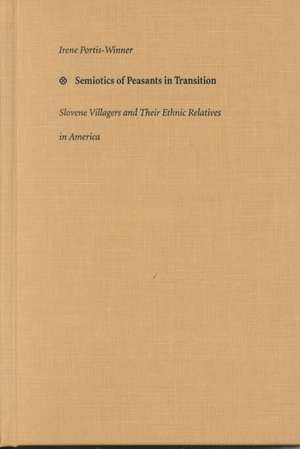Semiotics of Peasants in Transition – Slovene Villagers and Their Ethnic Relatives in America: Sound and Meaning: The Roman Jakobson Series in Linguistics and Poetics
Autor Irene Portis–winneren Limba Engleză Hardback – 30 iun 2002
Preț: 617.11 lei
Preț vechi: 680.90 lei
-9% Nou
Puncte Express: 926
Preț estimativ în valută:
118.09€ • 123.54$ • 98.09£
118.09€ • 123.54$ • 98.09£
Carte indisponibilă temporar
Doresc să fiu notificat când acest titlu va fi disponibil:
Se trimite...
Preluare comenzi: 021 569.72.76
Specificații
ISBN-13: 9780822328278
ISBN-10: 0822328275
Pagini: 200
Ilustrații: 13 b&w photographs, 4 figures
Dimensiuni: 162 x 232 x 22 mm
Greutate: 0.45 kg
Ediția:New.
Editura: MD – Duke University Press
Seria Sound and Meaning: The Roman Jakobson Series in Linguistics and Poetics
ISBN-10: 0822328275
Pagini: 200
Ilustrații: 13 b&w photographs, 4 figures
Dimensiuni: 162 x 232 x 22 mm
Greutate: 0.45 kg
Ediția:New.
Editura: MD – Duke University Press
Seria Sound and Meaning: The Roman Jakobson Series in Linguistics and Poetics
Cuprins
Acknowledgments
I. The Dynamics of a Dialogic Relation between a Peasant Village and Its Ethnic Counterpart: A Semiotic Approach
>Prologue: “The Strange Intruder” (from Peirce): A Peasant Village and Its Many Others
1. A Glance at the Village and Its Sister Ethnic Communities in Cleveland and Hibbing
II. Theoretical Issues and Terminology: From the Outer to the Inner Point of View
2. Nationalism, Ethnic Identity, Transnationalism: Issues of Terminology
3. Can We Find the Inner Point of View? Interpretative Anthropology, Performance Anthropology
4. Semiotics of Culture
>III. The Village and the Slovene Communities in Cleveland and Hibbing: A Historical Perspective
5. Zerovnica: Its Past and the Question of the Future
6. The Story of the Ethnic Community in Cleveland
IV. Semiotic Portraits
7. Semiotic Portraits in Cultural Context
8. Concluding Remarks
Notes
Selected Bibliography
Index
I. The Dynamics of a Dialogic Relation between a Peasant Village and Its Ethnic Counterpart: A Semiotic Approach
>Prologue: “The Strange Intruder” (from Peirce): A Peasant Village and Its Many Others
1. A Glance at the Village and Its Sister Ethnic Communities in Cleveland and Hibbing
II. Theoretical Issues and Terminology: From the Outer to the Inner Point of View
2. Nationalism, Ethnic Identity, Transnationalism: Issues of Terminology
3. Can We Find the Inner Point of View? Interpretative Anthropology, Performance Anthropology
4. Semiotics of Culture
>III. The Village and the Slovene Communities in Cleveland and Hibbing: A Historical Perspective
5. Zerovnica: Its Past and the Question of the Future
6. The Story of the Ethnic Community in Cleveland
IV. Semiotic Portraits
7. Semiotic Portraits in Cultural Context
8. Concluding Remarks
Notes
Selected Bibliography
Index
Recenzii
"This is an important ethnography, very different from the usual run-of-the-millvillage ethnographies of ex-Yugoslavia, and the methodology followed is a useful and potentially important addition to the literature on transnationalism." - Michael Herzfeld, author of Cultural Intimacy: Social Poetics in the Nation-State
Notă biografică
Irene Portis-Winner is a Visiting Scholar (2002-2003) at the Philosophy of Education Research Center, Harvard University.
Textul de pe ultima copertă
"This is an important ethnography, very different from the usual run-of-the-mill village ethnographies of ex-Yugoslavia, and the methodology followed is a useful and potentially important addition to the literature on transnationalism."--Michael Herzfeld, author of "Cultural Intimacy: Social Poetics in the Nation-State"
Descriere
Offers a new way of doing ethnography, based on an analysis of interaction between immigrants from a small village in Slovenia to the U.S. and the culture they left


